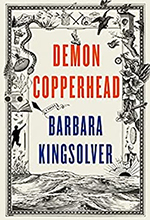11 January 2023
Demon Copperhead, by Barbara Kingsolver
Posted by Callan Bentley

Now here’s an interesting book: a retelling of David Copperfield (by Charles Dickens) but set in modern-day Appalachia, specifically Lee County, in the furthest-west tip of Virginia, where it makes a triangular insert between Kentucky and Tennessee. The arc of the original bildungsroman is a rags-to-riches tale set in Victorian England. Because of the physical and temporal distance between my current point in space-time and that of Copperfield, much of the poverty it depicts feels charming rather than shocking. But when those same dire circumstances are set in a modern context not far from where I live, it hits home in such a different manner. Frankly, it’s gutting. The coarse language, lack of education, poverty, breakdowns in families and social services, and in particular relentless drug use make for a very different reading experience. Kingsolver’s motivation may have been to bring focus to the ravages of widespread opioid addiction, and the book succeeds in that goal, but it’s no fun to read. The original novel was a delight – both in the way it was written, but also and most particularly in the incredible characters it portrayed: Mr. Micawber, Uriah Heep, Mr. Peggoty, Barkis the coach driver, Aunt Betsey Trotwood, and her companion Mr. Dick. That is a winning cast – each one its own literary flavor worth savoring. It chagrins me to report that the biggest disappointment of Demon Copperhead is that Kingsolver’s versions of these characters are nowhere near as compelling. The “translations” of the characters into the modern world is often cleverly done in terms of renaming them and giving them situation-appropriate dressings, but they don’t share the same soul as Dickens’ creations. They don’t pop. On the other hand, the exception is Demon Copperhead himself. He serves as the narrator of the book, and is more verbally distinct and “flavorful” than Dickens’s Copperfield narration. One thing that Kingsolver does very well is put small little errors into Copperhead’s speech that demonstrate his lack of worldliness. They are almost so subtle you could miss them, but it shows her mastery at crafting his essence. The character’s voice is astoundingly well developed, and that carries the novel.
So why would Kingsolver write this book? It’s a pretty astounding move, when you consider her track record of success in spinning up her own stories, that she would mimic the skeleton of one of the most celebrated novels of all time. The impetus for an accomplished writer to do such a thing appears to be a social conscience. If you’re in Kingsolver’s shoes, living in southwest Virginia, and you see a catastrophe unfolding in your community, how do you call the attention of the wider world to the immolation and suffering? She writes a novel. Given the sordid, sorrowful nature of the material, how do you keep people reading? One trick is to offer the assurance of a validation and redemption at the end – and knowing it’s based on on Copperfield might be just the trick to reassure readers that it will all be worth it by the final chapter. Via this story, she might be able to encourage society to address this forgotten, derided corner of the world. Wikipedia’s entry on Dickens reflects on the efficacy of his stories in providing motivational social commentary: “his fiction probably demonstrated its greatest prowess in changing public opinion in regard to class inequalities. He often depicted the exploitation and oppression of the poor and condemned the public officials and institutions that not only allowed such abuses to exist, but flourished as a result.” I think Kingsolver is driven toward a similar end. She personalizes addiction and makes it entirely plausible. The wisest and most grounded of her characters very clearly and blatantly pin the blame of Appalachia’s modern woes on Purdue Pharma. I came away from reading it with a more indelible sense of the chaos of modern living as teen in these depressed communities. It appears that the literati approves of her maneuver, and ratings of the book are high, but will it manifest any social impact? Will it translate into political action to improve the lot of those who dwell in post-coal Appalachia?


 Callan Bentley is Associate Professor of Geology at Piedmont Virginia Community College in Charlottesville, Virginia. He is a Fellow of the Geological Society of America. For his work on this blog, the National Association of Geoscience Teachers recognized him with the James Shea Award. He has also won the Outstanding Faculty Award from the State Council on Higher Education in Virginia, and the Biggs Award for Excellence in Geoscience Teaching from the Geoscience Education Division of the Geological Society of America. In previous years, Callan served as a contributing editor at EARTH magazine, President of the Geological Society of Washington and President the Geo2YC division of NAGT.
Callan Bentley is Associate Professor of Geology at Piedmont Virginia Community College in Charlottesville, Virginia. He is a Fellow of the Geological Society of America. For his work on this blog, the National Association of Geoscience Teachers recognized him with the James Shea Award. He has also won the Outstanding Faculty Award from the State Council on Higher Education in Virginia, and the Biggs Award for Excellence in Geoscience Teaching from the Geoscience Education Division of the Geological Society of America. In previous years, Callan served as a contributing editor at EARTH magazine, President of the Geological Society of Washington and President the Geo2YC division of NAGT.
Great review! And definitely, I agree. DEMON is a zillion times sadder than the D.C. original as the author describes the anguish and suffering of unprotected children in the U.S.A., the “greatest country in the world.” Kingsolver’s irony makes the book very powerful.